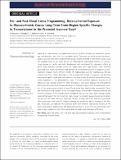Files in this item
Pre- and post-natal stress programming : developmental exposure to glucocorticoids causes long-term brain-region specific changes to transcriptome in the precocial Japanese quail
Item metadata
| dc.contributor.author | Marasco, Valeria | |
| dc.contributor.author | Herzyk, Pawel | |
| dc.contributor.author | Robinson, Jane | |
| dc.contributor.author | Spencer, Karen Anne | |
| dc.date.accessioned | 2016-05-30T14:35:48Z | |
| dc.date.available | 2016-05-30T14:35:48Z | |
| dc.date.issued | 2016-05-25 | |
| dc.identifier | 241920337 | |
| dc.identifier | 758dfecc-f3a0-4863-a170-4ffe41293c91 | |
| dc.identifier | 84990201268 | |
| dc.identifier | 000377513600007 | |
| dc.identifier.citation | Marasco , V , Herzyk , P , Robinson , J & Spencer , K A 2016 , ' Pre- and post-natal stress programming : developmental exposure to glucocorticoids causes long-term brain-region specific changes to transcriptome in the precocial Japanese quail ' , Journal of Neuroendocrinology , vol. 28 , no. 5 . https://doi.org/10.1111/jne.12387 , https://doi.org/10.1111/jne.12387 | en |
| dc.identifier.issn | 1365-2826 | |
| dc.identifier.other | Bibtex: urn:b1047cbf3bb48b6fe0e6c509beb2765d | |
| dc.identifier.other | ORCID: /0000-0002-2851-9379/work/78205003 | |
| dc.identifier.uri | https://hdl.handle.net/10023/8898 | |
| dc.description | Funding was provided by a Kelvin Smith PhD Scholarship from the University of Glasgow (VM, PH, JR, and KAS), and Biotechnology and Biological Sciences Research Council David Phillips Research Fellowship (K.A.S.). | en |
| dc.description.abstract | Exposure to stress during early development can permanently influence an individual's physiology and behavior, and affect its subsequent health. The extent to which elevated glucocorticoids cause such long-term “programming” remains largely untested. Here, using the Japanese quail as our study species, we independently manipulated exposure to corticosterone during pre- and/or post-natal development and investigated the subsequent effects on global gene expression profiles within the hippocampus and hypothalamus upon adulthood. Our results showed that the changes in transcriptome profiles in response to corticosterone exposure clearly differed between the hippocampus and the hypothalamus. We also showed that these effects depended on the developmental timing of exposure and identified brain-region specific gene expression patterns that were either (1) similarly altered by corticosterone regardless of the developmental stage in which hormonal exposure occurred, or (2) specifically and uniquely altered by either pre-natal or post-natal exposure to corticosterone. Corticosterone-treated birds showed alterations in networks of genes which included known markers of the programming actions of early life adversity (e.g. brain-derived neurotrophic factor, and mineralocorticoid receptor within the hippocampus; corticotropin-releasing hormone and serotonin receptors in the hypothalamus). Altogether, these findings provide for the first time experimental support to the hypothesis that exposure to elevated glucocorticoids during development may be a key hormonal signaling pathway through which the long-term phenotypic effects associated with early life adversity emerge and potentially persist throughout the lifespan. These data also highlight that stressors might have different long-lasting impacts on the brain transcriptome depending on the developmental stage in which they are experienced; more work is now required to relate these mechanisms to organismal phenotypic differences. | |
| dc.format.extent | 980245 | |
| dc.language.iso | eng | |
| dc.relation.ispartof | Journal of Neuroendocrinology | en |
| dc.subject | Early life stress | en |
| dc.subject | Pre- and post-natal glucocorticoid exposure | en |
| dc.subject | Brain transcriptome | en |
| dc.subject | Hippocampus | en |
| dc.subject | Hypothalamus | en |
| dc.subject | QH301 Biology | en |
| dc.subject | BF Psychology | en |
| dc.subject | RC0321 Neuroscience. Biological psychiatry. Neuropsychiatry | en |
| dc.subject | Endocrinology, Diabetes and Metabolism | en |
| dc.subject | Endocrinology | en |
| dc.subject | Endocrine and Autonomic Systems | en |
| dc.subject | Cellular and Molecular Neuroscience | en |
| dc.subject | NDAS | en |
| dc.subject | SDG 3 - Good Health and Well-being | en |
| dc.subject.lcc | QH301 | en |
| dc.subject.lcc | BF | en |
| dc.subject.lcc | RC0321 | en |
| dc.title | Pre- and post-natal stress programming : developmental exposure to glucocorticoids causes long-term brain-region specific changes to transcriptome in the precocial Japanese quail | en |
| dc.type | Journal article | en |
| dc.contributor.sponsor | BBSRC | en |
| dc.contributor.institution | University of St Andrews. School of Psychology and Neuroscience | en |
| dc.identifier.doi | https://doi.org/10.1111/jne.12387 | |
| dc.description.status | Peer reviewed | en |
| dc.identifier.url | http://onlinelibrary.wiley.com/doi/10.1111/jne.12387/suppinfo | en |
| dc.identifier.grantnumber | en |
This item appears in the following Collection(s)
Items in the St Andrews Research Repository are protected by copyright, with all rights reserved, unless otherwise indicated.

